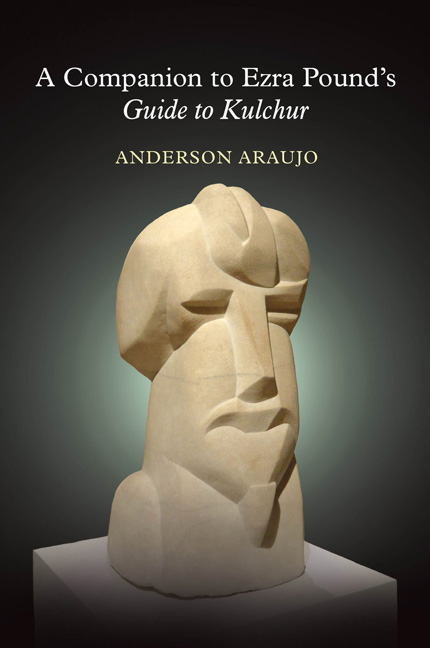Book contents
- Frontmatter
- Contents
- Acknowledgments
- Abbreviations
- Introduction
- Guide to Kulchur
- Part I
- Section I
- Section II
- Part II
- Section III
- Section IV
- Part III
- Section V
- Section VI
- Part IV
- Section VII
- Section VIII
- Section IV
- Part V
- Section X
- 44 Government
- 45 The Recurring Decimal
- 46 Decline Of The Adamses
- 47 Royalty And All That
- Section XI
- Part VI
- Section XII
- Section XIII
- Addenda: 1952
- Notes
- Index
46 - Decline Of The Adamses
from Section X
- Frontmatter
- Contents
- Acknowledgments
- Abbreviations
- Introduction
- Guide to Kulchur
- Part I
- Section I
- Section II
- Part II
- Section III
- Section IV
- Part III
- Section V
- Section VI
- Part IV
- Section VII
- Section VIII
- Section IV
- Part V
- Section X
- 44 Government
- 45 The Recurring Decimal
- 46 Decline Of The Adamses
- 47 Royalty And All That
- Section XI
- Part VI
- Section XII
- Section XIII
- Addenda: 1952
- Notes
- Index
Summary
John Adams had the corrective for Jefferson: Given his own Fascist proclivities in this period, it is not surprising that Pound should invoke Adams, who, in contrast with Jefferson, advocated for a strong national government, fearing that the United States had become “too much of a democracy, a system of governance that historically had ended everywhere in tyranny and chaos” (cf. note GK 42).
Liberalism is a running sore, and its surviving proponents are vile: Cf. Pound's categorical statement, “There are no good liberals,” made in August 1938 in Action, the journal of the British Union of Fascists. “The essence of Liberalism,” he continues, “consists in lying about usury, and refusing to connect morals with matters of money.”
“Droits de l'homme” … “right to do what harms not others”: Inaugurated in 1890, the Monument aux droits de l'homme (Monument to the Rights of Man), in Aurillac, France, displays the 17 Articles of the Declaration of the Rights of Man and of the Citizen, adopted in 1789. Here, Pound loosely translates an excerpt from Article 4, “La liberte consiste a pouvoir faire tout ce qui ne nuit pas a autrui” (“Liberty consists in the freedom to do everything which injures no one else”).
Corrado Ricci … via Aurelia: (1858–1934), Italian writer, art historian, archeologist, and author of Il tempio malatestiano (1924), published twelve years after he began a complete restoration of the interior of the church so admired by Pound. The poet met with Ricci in February 1923, and in the following year Mussolini approved Ricci's project to rebuild the areas around the imperial forums, culminating with the monumental construction of the via Dell'Impero (present-day via dei Fori Imperiali). Since imperial times the via Aurelia has been one of the main thoroughfares into Rome from the west.
Pythagoras and Confucius: Cf. notes GK 24, 15, respectively. T. Beecham: Sir Thomas Beecham (1879–1961), English conductor hailed by Pound in a letter of 1917 as not only an “intelligent” man but also “the only man in England who can conduct an orchestra.”
- Type
- Chapter
- Information
- A Companion to Ezra Pound's Guide to KulcherGuide to Kulcher, pp. 274 - 275Publisher: Liverpool University PressPrint publication year: 2018



